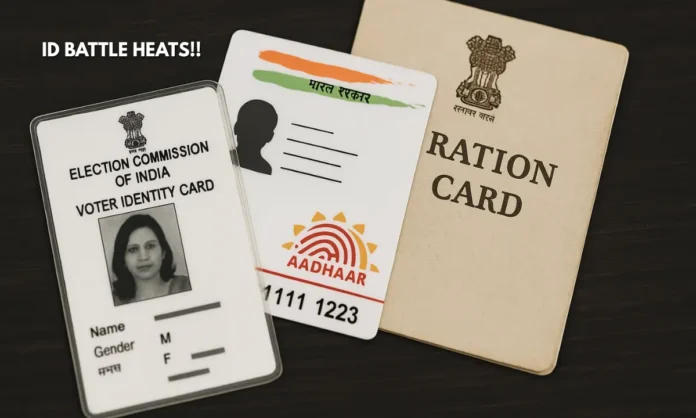Summary
- Election Commission (EC) told SC that Aadhaar, voter ID, and ration cards cannot independently prove citizenship.
- EC emphasized that these documents can only supplement other valid proofs during Bihar’s electoral roll revision.
- Around 2.9 crore voters in Bihar must submit additional documentary evidence for inclusion in revised rolls.
EC Defends Exclusion of Aadhaar and Voter ID as Primary Proof
- EC filed a counter-affidavit in the Supreme Court, clarifying that Aadhaar and voter ID do not establish Indian citizenship.
- The poll panel argued that ration cards are widely prone to forgery, reducing their credibility as primary proof.
- EC maintained that its list of 11 valid documents for proving citizenship is “indicative, not exhaustive.”
The Election Commission’s response came after the Supreme Court’s July 10 directive to consider Aadhaar, voter ID, and ration cards during Bihar’s special electoral roll revision. The petitioners had challenged the exclusion of these documents for verifying citizenship, arguing that millions of voters risk disenfranchisement.
No Aadhar Card in Voter List Revision in Bihar
— The Chronology (@TheChronology__) July 22, 2025
Election Commission (EC) has informed the Supreme Court that Aadhaar, voter ID cards, and ration cards are not valid proofs for verifying voter eligibility in Bihar’s Special Intensive Revision (SIR) of electoral rolls.
EC… pic.twitter.com/NIYcqobZgL
Implications for Bihar’s Voters
- Approximately 37% of Bihar’s 7.8 crore voters (around 2.9 crore people) must provide new proof of eligibility.
- Voters born before July 1, 1987, need documents proving their birth details, while younger voters must also show their parents’ birth records.
- The draft voter roll will be published on August 1, with the final list due on September 30.
The EC clarified that electoral registration officers will review all presented documents, including ration cards, but the final acceptance will be based on a case-by-case assessment. It also argued that voter ID cards, which are derived from existing rolls, cannot be relied upon while the rolls themselves are being revised.
Political and Legal Concerns
- Opposition parties under the INDIA bloc have warned that 2.5 crore voters could be disenfranchised due to stringent documentation requirements.
- The Supreme Court had earlier noted that citizenship verification falls under the Union government, not the Election Commission.
- EC defended its powers, stating that the Special Intensive Revision (SIR) enhances the integrity of elections by removing ineligible voters.
The SC will further hear petitions challenging the EC’s approach, with Advocate Gopal Sankaranarayanan arguing that the burden of proving citizenship is being unfairly shifted to voters.
Final Verdict: A High-Stakes Revision Amid Legal Scrutiny
The Bihar voter roll revision has become a contentious issue, balancing the need to ensure clean electoral rolls against the risk of disenfranchising genuine voters. With Aadhaar, voter ID, and ration cards relegated to supplementary status, the burden on citizens to produce acceptable documentation is immense. The Supreme Court’s eventual ruling will likely redefine the boundaries of EC’s authority and the framework of voter verification ahead of Bihar’s crucial assembly elections.


